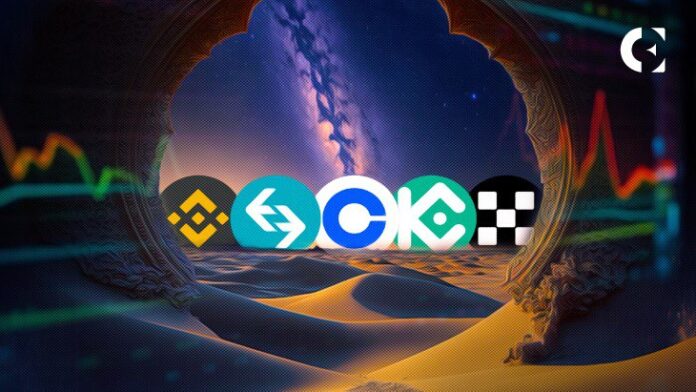Entering the crypto industry and navigating through the diverse landscape of Web3 services can be a formidable challenge for both new users and experienced traders. The vast array of cryptocurrencies demands a suitable platform that facilitates the trading of digital assets.
What is a Cryptocurrency Exchange?
Cryptocurrency exchanges serve as the go-to platforms for buying, selling, and trading crypto, much like traditional stock exchanges. Cryptocurrency exchanges play a crucial role in assisting investors and traders in transactions involving popular cryptocurrencies such as Bitcoin, Ethereum, Tether, and many others. However, the abundance of exchanges in the market can make it overwhelming for newcomers to decide which one to choose.
Types of Cryptocurrency Exchanges
Centralized Exchanges
Centralized cryptocurrency exchanges serve as intermediaries between buyers and sellers, distinguishing themselves from traditional stock exchanges by focusing on digital assets, including cryptocurrencies and NFTs. These platforms dominate digital asset trading volumes due to their accessibility for beginners and the array of services offered, such as spot trading, margin trading, leverage trading, and copy trading. Leading industry players, including Binance, Coinbase, Bitget, and KuCoin, operate as centralized exchanges.
Advantages of Centralized Cryptocurrency Exchanges
● Beginner-friendly:
Centralized exchanges provide user-friendly interfaces and guidelines, enabling novice investors to navigate the platform without prior technological knowledge.
● Great Liquidity:
These exchanges contribute significantly to crypto transactions, ensuring liquidity that facilitates instant buying and selling. Higher liquidity reduces volatility, a crucial factor in the inherently volatile crypto market.
● Security:
Centralized exchanges mitigate the risk of private key loss, a common concern for cryptocurrency holders. By safeguarding investors’ holdings, these exchanges enhance the security of digital assets.
Disadvantages of Centralized Crypto Exchanges
● Custody of Digital Assets:
While centralized exchanges offer a safeguard against private key loss, the risk of exchange failure, hacking, or fraud remains, potentially jeopardizing users’ digital assets.
● Transaction Fees:
Centralized exchanges often impose higher transaction fees compared to decentralized counterparts. Despite these fees, many users opt for centralized exchanges due to their service variety, convenience, and accessibility.
Decentralized Exchanges
Decentralized exchanges (DEXs) function as peer-to-peer marketplaces connecting buyers and sellers. Unlike centralized exchanges, DEXs are non-custodial, granting users control over their private keys. Instead of relying on intermediaries, DEXs employ smart contracts that automatically execute trades based on predefined conditions.
Advantages of Decentralized Exchanges
● Trustless Transactions:
DEXs eliminate the need for users to know or trust a platform, as smart contracts execute trades independently, ensuring trustless transactions.
Disadvantages of Decentralized Exchanges
● Intimidating for Beginners:
Decentralized exchanges may pose a challenge for novice traders and those less familiar with the technology, requiring a steeper learning curve.
● Liquidity:
The majority of transactions occur on centralized exchanges, leading to reduced liquidity for decentralized ones. Additionally, DEXs often lack support for fiat currencies and withdrawals into bank accounts, limiting their functionality.
Top Five Cryptocurrency Exchanges in the Middle East
This article provides an overview of the top five exchanges in the Middle East. We will delve into their features and highlight what sets each exchange apart from the others, offering valuable insights for traders seeking a platform that aligns with their specific needs and preferences.
Binance:
Launched in June 2017, Binance has become the world’s largest crypto exchange by trading volume, exceeding $76 billion in daily trading volume as of August 2022, with a user base of over 90 million customers worldwide.
The exchange grew into one of the largest cryptocurrency exchanges in the world within 180 days of its launch. Binance offers users the opportunity to trade hundreds of cryptocurrencies on spot, margin, and futures markets.
Moreover, the crypto company provides a wide variety of Web3 services, including Binance Earn, where users can earn interest on their crypto; Binance P2P, where traders can sell and buy cryptocurrencies; Binance Launchpad, a place to buy or earn new tokens; and Binance NFT Marketplace, where users can trade stake and loan NFTs.
Bitcoin claims the leading spot as the number one cryptocurrency on the platform, accounting for 28.9%. Following closely is USDT, with a 24.79% dominance on the exchange, and Binance’s native token, BNB, holds 11.03% of the overall token allocation on the platform.
Pros and Cons
| Pros | Cons |
| High trading volume | Regulatory concerns |
| Simple user interface | Intimidating for beginners |
| Large selection of trading options |
FAQs
● Is Binance good for beginners?
While Binance boasts a straightforward user interface, some may perceive the platform as slightly advanced, especially for novice traders.
● What are the disadvantages of Binance?
Binance faced regulatory concerns and lawsuits from the United States Securities and Exchange Commission (SEC).
● Does Binance have its own token?
Binance Coin (BNB) is the native cryptocurrency of the Binance platform. While the token was initially built on the Ethereum network, it has since migrated to Binance’s own blockchain, known as Binance Chain.
Bitget:
Established in 2018, Bitget ranks among the top five exchanges in the Middle East, boasting over 20 million registered users and a listing of more than 550 cryptocurrencies. While it offers both spot and futures trading, Bitget is renowned for its leading copy trading platform, particularly beneficial for beginners navigating market complexities.
Bitget’s user-friendly copy trading platform has attracted over 80,000 traders since its launch. Currently hosting more than 130,000 elite traders and 650,000 followers and realizing over $430 million in profits, the platform showcases top traders based on return on investment (ROI), all-time profits, and followers’ profits.
Notably, Bitget also provides bot copy trading, allowing users to automate their trades effortlessly. This feature simplifies strategy forecasting, as users are not required to make precise market predictions. The platform boasts flexibility and risk reduction by allowing traders to set their desired price range while the bot handles the rest.
Bitget has an average daily volume of $10 billion and is a trusted platform for new and experienced traders. The BGB token is the native utility token of Bitget and can be used by traders for staking, social trading, profit sharing, or receiving discounts on trading fees.
Additionally, Bitget has expanded its support for Arabic speakers in over eleven Middle-Eastern and North African countries, allowing trades in over twelve Middle-Eastern currencies, through its mobile app and website, enhancing accessibility for Arabic-speaking audiences, facilitating smoother learning processes, and improving communication for cryptocurrency transactions.
The expansion aligns with Bitget’s commitment to the Middle East, where it already supports Fiat gateways for seven currencies. Users in the region can access a range of features, including P2P, Earn, Futures, and Copy-trading, with zero fees for buying and selling through Bitget P2P, emphasizing a seamless trading experience and better regional support overall.
Bitget understands the risks and challenges associated with online transactions and aims to protect users’ assets and create a more secure trading environment. Bitget requires mandatory Know-Your-Customer (KYC) procedures and has an anti-phishing code in its emails to help users distinguish authentic Bitget emails.
Pros and Cons
| Pros | Cons |
| High-security measures | Restricted in certain countries |
| Variety of Web3 services and platforms | |
| One of the best copy trading platforms | |
| Low trading fees |
FAQs
● How many cryptocurrencies are supported on Bitget?
Bitget supports over 550 cryptocurrencies, including Bitcoin (BTC), Ethereum (ETH), Tether (USDT), Litecoin (LTC), Ripple (XRP), Chainlink (LINK), Cardano (ADA), and Polygon (MATIC).
● Is Bitget secure?
Bitget is considered one of the most secure crypto exchanges due to several implemented security measures. The exchange has incorporated an anti-phishing code in its emails, segregates users’ funds into distinct cold and hot wallets, and maintains a substantial protection fund exceeding $350 million.
● What is a BGB token?
Bitget Token (BGB) is the native utility token for the Bitget exchange. It was introduced with the primary purpose of offering users within the platform a means of payment within its ecosystem.
BGB holds utility in various capacities, including staking, engaging in social trading activities, and obtaining discounts on trading fees.
● How can traders buy crypto?
Bitget supports fiat currencies through Mastercard, Visa, Union Pay, Google Pay, Apple Pay, and bank deposits.
Coinbase:
A U.S.-based crypto trading platform where users can easily buy, sell, and store cryptocurrencies. Established in 2012, the exchange is one of the five top crypto exchanges in the Middle East.
Coinbase claims to be “building the crypto economy,” a more fair, accessible, efficient, and transparent financial system enabled by crypto.
One of the key factors that distinguishes Coinbase is its commitment to being the most trusted crypto platform. The exchange boasts of having high standards for what assets to list, which services to provide, and who has access to their products.
Users can earn crypto through staking on the exchange and a “learn-to-earn” program. The educational program helps users learn about cryptocurrencies and how they work, and they will earn crypto in return. Coinbase created educational tutorials to teach users about different cryptocurrencies.
Like many other crypto exchanges, Coinbase has a wallet where traders can store and manage their digital assets, including crypto and NFTs. The wallet supports hundreds of thousands of tokens and dApps, enabling users to explore the decentralized web on their phone or browser.
Pros and Cons
| Pros | Cons |
| Offers many withdrawal options, including PayPal | Higher fees than other exchanges |
| Beginner-friendly | Limited advanced options for expert traders |
| Trusted by U.S. regulators |
FAQs
● Where is Coinbase located?
Coinbase is headquartered in San Francisco, California, the United States.
● Is Coinbase a good choice for beginner traders?
Coinbase makes it easy for both beginners and experienced users to trade and store cryptocurrencies.
● What are the disadvantages of trading on Coinbase?
One disadvantage of Coinbase is the perceived high fees compared to its competitors, according to many reviewers.
KuCoin:
KuCoin, one of the top five cryptocurrency spot exchanges, according to CoinMarketCap, boasts 30 million global investors and support for more than 700 coins. Established in 2017, the exchange is known as the “people’s exchange” due to its low trading fees and user-friendly interface, which attract beginners and advanced traders.
KuCoin supports various fiat currencies and cryptocurrencies, making trading assets easier. With support for over 50 fiat currencies through the P2P market and credit/debit card channels, KuCoin offers a seamless exchange experience for users in more than 200 countries.
One of the notable features of KuCoin is its high security. The exchange stores assets in independent wallets, has advanced private key management, and has a trusted computing environment. The platform also features 24/7 wallet address monitoring with suspicious behavior alerts.
New users are rewarded for signing up on the KuCoin exchange. The exchange stated its commitment to giving new users rewards, including USDT and coupons worth up to 700 USDT. Users who complete their sign-up, make their first deposit/crypto purchases, first purchases, and engage in pro trading are eligible to receive the rewards.
The native token, KCS, provides users with reduced trading fees. The platform offers competitive trading fees, starting at 0.1% for their spot trading tool. The exchange offers spot trading, bot trading, and futures trading.
Moreover, one of the exchange’s services is KuCoin Pool, a mining pool that provides users with one of the lowest mining fees in the industry with optimized algorithms for higher mining efficiency. The platform is committed to providing various Web3 services and has launched a crypto wallet named “Halo Wallet,” the first social crypto wallet that connects users to Web3.
Pros and Cons
| Pros | Cons |
| Low trading and withdrawal fees | Not beginner-friendly |
| Offers advanced trading features |
FAQs
● Where is KuCoin based?
KuCoin Exchange is a cryptocurrency exchange headquartered in the Seychelles.
● How many cryptocurrencies does KuCoin support?
More than 700 cryptocurrencies are currently supported on the KuCoin exchange.
● Does KuCoin have its own token?
KuCoin’s native token is KCS, and it functions as a means of payment for trading fees on the KuCoin exchange. Users can utilize KCS to trade at a reduced fee, providing them with a cost-saving advantage on the platform.
OKX:
A global leader in digital asset exchanges, OKX offers Web3 financial services to millions of traders in over 180 regions, with offices in Dubai, Turkey, Hong Kong, Singapore, and Australia.
Users can trade hundreds of tokens and trading pairs on spot, margin, and derivatives markets on the OKX exchange. Moreover, the exchange offers options, futures, perpetual swap trading, lending, and mining services.
Ranking third in cryptocurrency derivatives exchanges, OKX boasts 221 markets, with open interest totaling $4 billion and total assets surpassing $12 billion. The exchange provides a crypto hot wallet, an NFT marketplace, and decentralized applications (dApps) as part of its “portal to Web3” services.
The exchange lists over 350 cryptocurrencies and supports more than 500 trading pairs, solidifying its position as one of the top five crypto exchanges in the Middle East. OKX provides intelligent pre-built bot trading services, enabling users to automate their trading strategies and earn around the clock.
OKX’s bot trading currently has more than 400 thousand global bot traders, $158 million in bot trading earnings, and 9.63 million bots created worldwide.
Pros and Cons
| Pros | Cons |
| One of the top crypto derivatives exchanges | Not available in the United States |
| Low trading fees for spot and futures trades |
FAQs
● How many cryptocurrencies does OKX support?
OKX supports more than 350 cryptocurrencies and more than 500 trading pairs.
● Where is OKX based?
OKX maintains a headquarters in Seychelles with additional offices around the world.
● What options for trading are available on the OKX exchange?
The OKX exchange offers a diverse range of trading options, including copy trading, spot trading, futures trading, options trading, OTC (Over-the-Counter) trading, margin trading, and trading bots.
Disclaimer: The information presented in this article is for informational and educational purposes only. The article does not constitute financial advice or advice of any kind. Coin Edition is not responsible for any losses incurred as a result of the utilization of content, products, or services mentioned. Readers are advised to exercise caution before taking any action related to the company.










